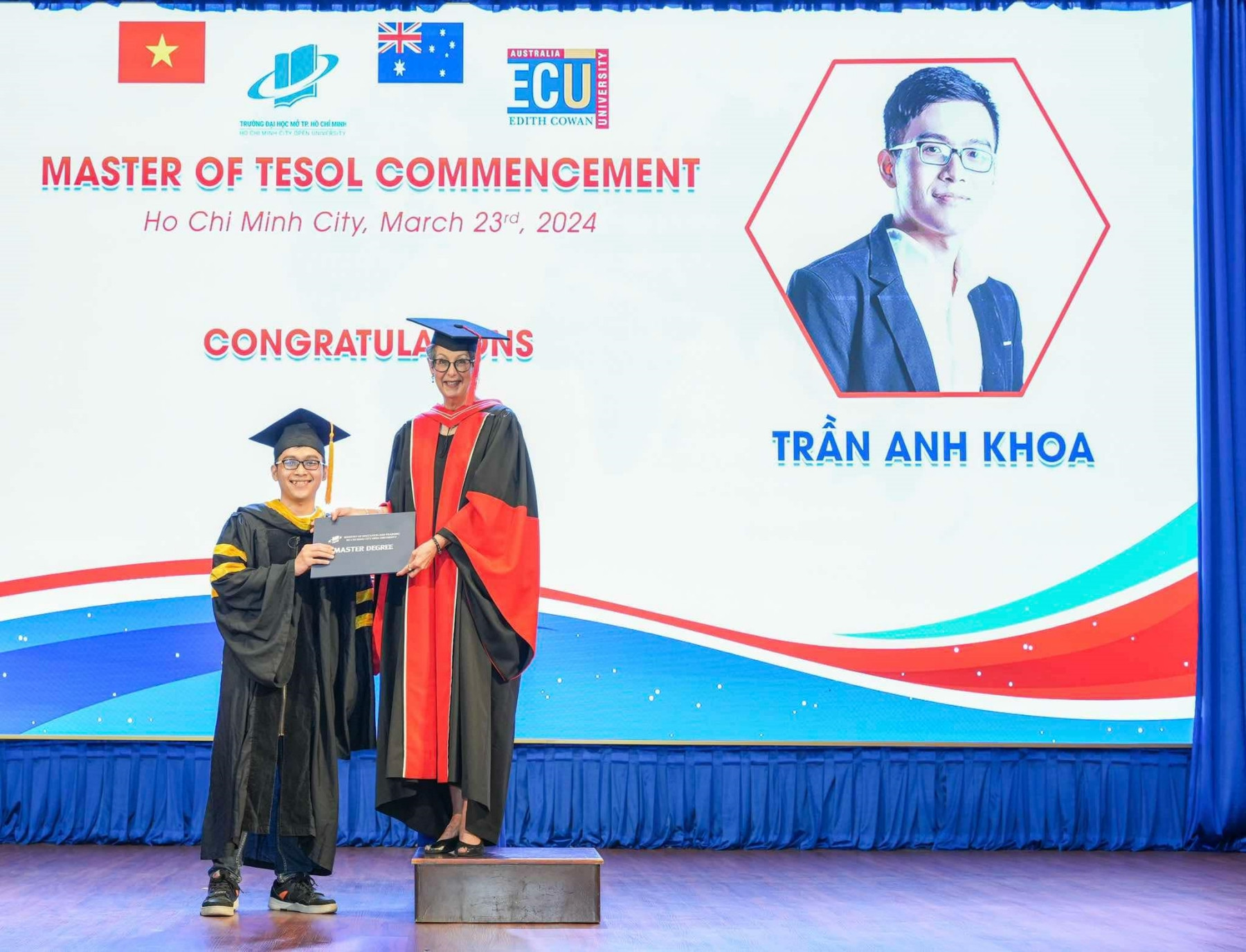Having achieved 9.0 IELTS after 4 attempts, Anh Khoa believes that one should not expect that preparing for this exam will be as quick and easy as getting a driver's license. Candidates must practice enough and with the right method to see clear progress.
Tran Anh Khoa, a teacher at an English center in Ho Chi Minh City, just achieved 9.0 IELTS at the end of December, with Listening and Reading skills reaching 9.0, Speaking and Writing reaching 8.5. Khoa said that he was exposed to this language quite early, mainly through watching cartoon videos and listening to simple vocabulary such as "elephant", "monkey"...
“This helps me learn English in a gradual way, but it is still just random accumulation, not systematic,” Khoa said.
In grade 12, Khoa studied in the English class at Le Hong Phong High School for the Gifted (HCMC) and won the third prize in the national excellent student competition. Thanks to this achievement, he was directly admitted to the English Language Department of the University of Social Sciences and Humanities, Ho Chi Minh City National University.
Before taking the IELTS test, Khoa had taken the Flyers, TOEIC Bridge, TOEFL iBT and got good results in all of them. When he became a tutor in college, Khoa decided to take the IELTS test to self-evaluate his English learning process and know what level he was at. Up to now, Khoa has taken the IELTS test 4 times, in which he got 8.0 on the first test.

In the previous exams, Khoa achieved perfect scores in Reading and Listening. He believes that these are also two skills that Vietnamese people can easily achieve high scores in. However, Khoa also pointed out some things to note in Reading.
Specifically, candidates need to focus on reading comprehension instead of skimming to find keywords, because IELTS tests often create “trap” options by including similar words in the reading passage. At that time, candidates who do not understand the correct meaning but only see similar keywords and then choose the answer will easily make a mistake.
For reading passages with a lot of difficult vocabulary, Khoa suggests applying the "simplification" mindset - simplifying sentences to turn complex sentences into short, easy-to-understand sentences, thereby reading faster but still understanding the main idea to answer questions and "read connections" - paying attention to the connections between sentences to know which information is important and guessing unfamiliar words when needed.
For Listening skills, Khoa believes that one should be patient in practicing and listening to a variety of topics, because if one only listens to content that one likes, one may have difficulty when encountering unfamiliar topics. “For example, on the day of the exam, I encountered a topic about archaeology. Luckily, I had read about this topic before, so I was not psychologically disturbed and confused when encountering unfamiliar content.”
In addition, according to him, reading skills also complement the listening part, because if candidates have the ability to read and quickly extract the main ideas of the questions and options, they will be more sensitive in grasping important information and eliminating distracting information.
With speaking skills, Khoa should practice thinking and talking to himself in English instead of thinking in Vietnamese and then translating it into English. “Thinking in Vietnamese and then translating it into English will make the brain take an extra step before speaking a complete sentence, thereby affecting fluency,” Khoa said. This is also a way to help him practice his reflexes when speaking English.

The Faculty of Writing assesses Writing as the most difficult skill and the easiest to lose points, because this part includes 4 criteria including vocabulary, grammar, Task Response (appropriate and relevant answers to the topic), Coherence and Cohesion (coherence and coherence). Therefore, candidates need to have logical thinking and be able to avoid rambling and lacking connection.
In this section, Khoa applies the Linearthinking and Specify thinking methods to develop ideas and answer more accurately.
“A mistake that causes candidates to not get high scores in this section is focusing on “showing off” a lot of big vocabulary without investing in developing ideas. Therefore, the writing may look “impressive” at first glance, but the content inside is not specific, natural, logical, or even off-topic.
The first few times I took the test, I made the same mistake, but then improved by prioritizing logic and connection for ideas, and prioritizing naturalness for vocabulary and grammar,” Khoa said.
However, according to Anh Khoa, with language, no matter how effective the learning method is, it still takes time to practice to master it. “Candidates should not expect that preparing for the IELTS exam will be as quick and easy as taking a driving test. You need to practice enough and with the right method to see clear progress,” Khoa said.
After achieving a perfect IELTS score, Anh Khoa said that in the coming time, in addition to focusing on work, he will review to try to conquer the perfect SAT score of 1600/1600.


Source: https://vietnamnet.vn/thay-giao-tre-dat-9-0-ielts-thi-ielts-khong-nhanh-va-de-nhu-lay-bang-lai-2359519.html






![[Photo] Prime Minister Pham Minh Chinh attends the event "Digital transformation of the banking industry by 2025"](https://vphoto.vietnam.vn/thumb/1200x675/vietnam/resource/IMAGE/2025/5/29/0e34cc7261d74e26b7f87cadff763eae)






















![[Photo] Prime Minister Pham Minh Chinh receives leaders of Excelerate Energy Group](https://vphoto.vietnam.vn/thumb/1200x675/vietnam/resource/IMAGE/2025/5/29/c1fbe073230443d0a5aae0bc264d07fe)




























































Comment (0)